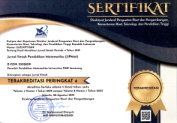MENGGUNAKAN CONTOH DALAM PEMBUKTIAN
Abstract
Full Text:
PDFReferences
Alcock, Lara dan Adrian Simpson. “Classification and Concept Consistencyâ€. Canadian Journal of Science, Mathematics and Technology Education, (2011) 11:2, 91-106. DOI:10.1080/14926156.2011.570476
Bartle, Robert G dan Donald R. Sherbert. 2010. Introduction to Real Analysis (Fourth Edition). John Wiley & Sons, Inc.
Bills, E. dan David Tall. “Operable definitions in advanced mathematics: The case of least upper boundâ€. Proceedings of PME 22 (1998), 2: 104-111. Stellenbosch, South Africa.
Dawson, John W. “Why Do Mathematicians Re-prove Theorems?†Philosophia Mathematica (III) 14 (2006):269–286. DOI:10.1093/philmat/nkl009.
Ellis, Ami B, et al. “Choosing and Using Examples: How Example Activity can Support Proof Insightâ€. Dalam Lindmeier, A. M. & Heinze, A. (Eds.). Proceedings of the 37th Conference of the International 2 – 265. Group for the Psychology of Mathematics Education, Vol. 2 (2013): 265-272. Kiel, Germany: PME.
Hanna, Gila dan Michael de Villiers. “The 19th ICMI Study: Proof and proving in mathematics educationâ€. ZDM Mathematics Education (2008) 40: 329–336. Dordrecht: Springer. DOI 10.1007/s11858-008-0073-4.
Harel, Guershon dan Evan Fuller. “Reid, D.A. and Knipping, C.: Proof in mathematics education: research, learning, and teachingâ€. ZDM Mathematics Education (2013) 45:497–499. DOI 10.1007/s11858-013-0497-3.
Hemmi, Kirsti. “Three styles characterising mathematicians’ pedagogical perspectives on proofâ€. Educ Stud Math (2010) 75:271–291. Springer. DOI 10.1007/s10649-010-9256-3
Ioannou, Marios. “Commognitive Analysis of Undergraduate Mathematics Students’ Responses in Proving Subgroup’s Non-Emptinessâ€. Dalam White, B., Chinnappan, M. & Trenholm, S. (Eds.). Opening up mathematics education research (Proceedings of the 39th annual conference of the Mathematics Education Research Group of Australasia) (2016): 344–351. Adelaide: MERGA.
Ko, Yi-Yin dan Eric Knuth. “Undergraduate mathematics majors’ writing performance producing proofs and counterexamples about continuous functionsâ€. Journal of Mathematical Behavior 28 (2009): 68–77. Elsevier. DOI:10.1016/j.jmathb.2009.04.005.
Lai, Yvonne; Keith Weber and Juan Pablo Mejıa-Ramos. “Mathematicians’ Perspectives on Features of a Good Pedagogical Proofâ€. Cognition and Instruction, 30(2) (2012): 146–169. Taylor & Francis Group, LLC. DOI: 10.1080/07370008.2012.661814.
Lockwood, Elise; Amy B. Ellis, dan Alison G. Lynch. “Mathematicians’ Example-Related Activity when Exploring and Proving Conjecturesâ€. Int. J. Res. Undergrad. Math. Ed. (2016) 2:165–196. Springer International Publishing Switzerland. DOI 10.1007/s40753-016-0025-2.
Mairing, Jackson Pasini. “Student’s Difficulties in Solving Problem of Real Analysisâ€. Dalam Proceeding of International Conference on Research, Implementation and Education of Mathematics And Sciences 2014, Yogyakarta State University, 18-20 May 2014.
Mackey, A. dan Gass, S. M. Second Language Research: Methodology and Design Second Edition. New York: Routledge, 2016.
Mills, Melissa. “A framework for example usage in proof presentationsâ€. Journal of Mathematical Behavior 33 (2014) 106–118. Elsevier Inc. http://dx.doi.org/10.1016/j.jmathb.2013.11.001.
Selden, Annie. “Transitions and Proof and Proving at Tertiary Levelâ€. Dalam Proof and Proving in Mathematics Education. Hanna, G. dan Villiers, M. D. New ICMI Study Series Vol. 15. 2012. Springer.
Selden, Annie dan John Selden. “Overcoming students’ difficulties in learning to understand and construct proofsâ€. Technical report of Department of Mathematics, Tennessee Technological University 2007-1.
Selden, Annie dan John Selden. “Proof and Problem Solving at University Levelâ€. The Mathematics Enthusiast: Vol. 10: No. 1 (2013), Article 14.
Stavrou, S. G. “Common Errors and Misconceptions in Mathematical Proving by Education Undergraduatesâ€. IUMPST: The Journal. Vol 1 (Content Knowledge), March 2014.
Stylianou1, Despina A.; Maria L. “Blanton dan Ourania Rotou. Undergraduate Students’ Understanding of Proof: Relationships between Proof Conceptions, Beliefs, and Classroom Experiences with Learning Proofâ€. Int. J. Res. Undergrad. Math. Ed. (2015) 1:91–134. DOI 10.1007/s40753-015-0003-0
Tall, David, et al. “Cognitive Development of Proofâ€. Dalam Proof and Proving in Mathematics Education. Hanna, G. dan Villiers, M. D. 2012. New ICMI Study Series Vol. 15. Springer.
Thompson, Dennise. R.; Sharon L. Senk dan Gwendolyn J. Johnson. “Opportunities to learn reasoning and proof in high school mathematics textbooksâ€. Journal for Research in Mathematics Education, (2012) Vol. 43, No. 3: 253-295.
Weber, Keith. “Student difficulty in constructing proofs: The need for strategic knowledgeâ€. Educational Studies in Mathematics. (2001) 48(1):101-11.
DOI: https://doi.org/10.26877/jipmat.v2i1.1475
Refbacks
- There are currently no refbacks.
JIPMat (Jurnal Ilmiah Pendidikan Matematika) Indexed by:
JIPMat (Jurnal Ilmiah Pendidikan Matematika) is licensed under a Creative Commons Attribution-ShareAlike 4.0 International License.




















